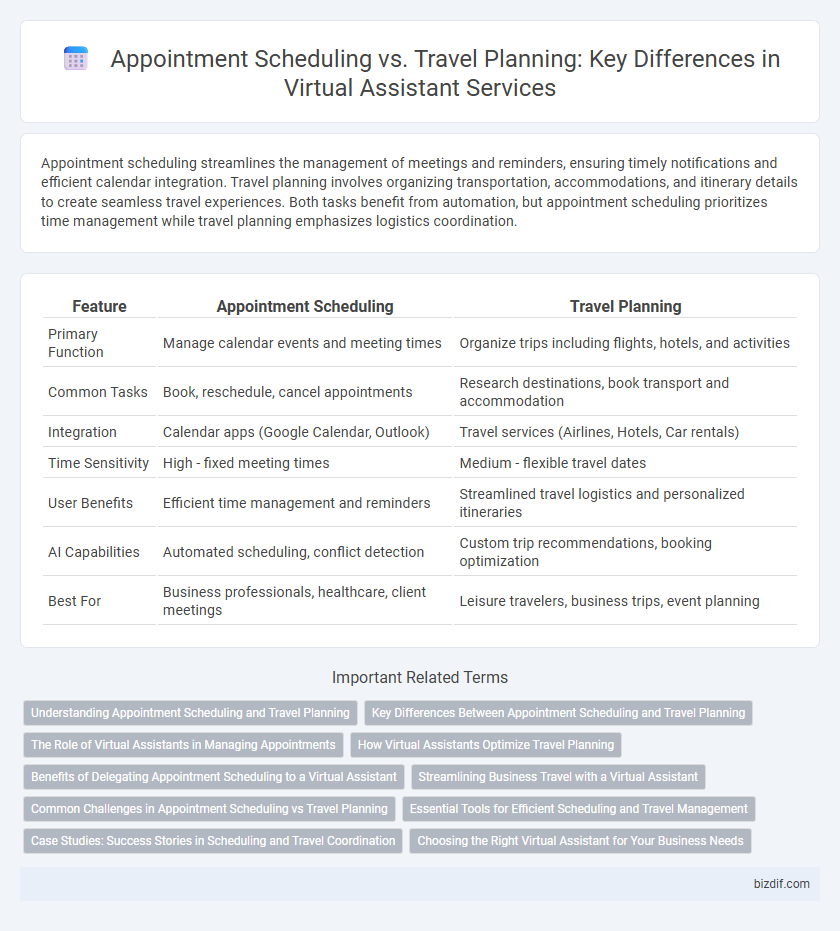Appointment scheduling streamlines the management of meetings and reminders, ensuring timely notifications and efficient calendar integration. Travel planning involves organizing transportation, accommodations, and itinerary details to create seamless travel experiences. Both tasks benefit from automation, but appointment scheduling prioritizes time management while travel planning emphasizes logistics coordination.
Table of Comparison
| Feature | Appointment Scheduling | Travel Planning |
|---|---|---|
| Primary Function | Manage calendar events and meeting times | Organize trips including flights, hotels, and activities |
| Common Tasks | Book, reschedule, cancel appointments | Research destinations, book transport and accommodation |
| Integration | Calendar apps (Google Calendar, Outlook) | Travel services (Airlines, Hotels, Car rentals) |
| Time Sensitivity | High - fixed meeting times | Medium - flexible travel dates |
| User Benefits | Efficient time management and reminders | Streamlined travel logistics and personalized itineraries |
| AI Capabilities | Automated scheduling, conflict detection | Custom trip recommendations, booking optimization |
| Best For | Business professionals, healthcare, client meetings | Leisure travelers, business trips, event planning |
Understanding Appointment Scheduling and Travel Planning
Appointment scheduling involves organizing and managing clients' or team members' calendars to ensure timely meetings and avoid conflicts, emphasizing efficient time allocation and reminders. Travel planning requires coordinating routes, accommodations, transportation, and activities to create seamless itineraries that optimize time and budget. Both tasks benefit from virtual assistants' use of automation tools and real-time updates to enhance productivity and reduce errors.
Key Differences Between Appointment Scheduling and Travel Planning
Appointment scheduling involves organizing and managing specific time slots for meetings or events, emphasizing precise timing and participant availability. Travel planning requires coordinating more complex logistics such as transportation, accommodation, and itinerary details, prioritizing flexibility and contingency options. Key differences include the level of complexity, duration of planning, and the types of resources managed, with appointment scheduling focusing on calendar management and travel planning encompassing broader, multi-faceted arrangements.
The Role of Virtual Assistants in Managing Appointments
Virtual assistants streamline appointment scheduling by automating calendar management, sending timely reminders, and coordinating with multiple parties to prevent conflicts. They enable efficient handling of recurring meetings and adapt to real-time changes, reducing manual workload and enhancing productivity. This contrasts with travel planning, where virtual assistants focus on booking, itinerary optimization, and alerting for travel updates.
How Virtual Assistants Optimize Travel Planning
Virtual assistants enhance travel planning by efficiently managing complex itineraries, booking flights, hotels, and transportation based on user preferences and real-time availability. They leverage AI-driven algorithms to provide personalized recommendations, optimize routes, and integrate with calendar systems to prevent scheduling conflicts. This automation reduces manual effort, saves time, and ensures seamless coordination of travel activities compared to traditional appointment scheduling tasks.
Benefits of Delegating Appointment Scheduling to a Virtual Assistant
Delegating appointment scheduling to a virtual assistant streamlines calendar management by eliminating double bookings and ensuring timely reminders, which enhances productivity and reduces stress. Virtual assistants utilize advanced scheduling tools to optimize availability, freeing up valuable time for strategic tasks and client interactions. This efficient delegation allows businesses to maintain organized workflows and improve overall operational efficiency.
Streamlining Business Travel with a Virtual Assistant
Streamlining business travel with a virtual assistant enhances efficiency by automating appointment scheduling and travel planning, reducing manual workload and minimizing errors. Virtual assistants integrate calendar management with flight and accommodation bookings, ensuring seamless coordination and real-time updates. Leveraging AI-powered tools improves time management and allows professionals to focus on core business activities during travel.
Common Challenges in Appointment Scheduling vs Travel Planning
Appointment scheduling and travel planning face shared challenges such as managing fluctuating availability and handling last-minute changes efficiently. Both require accurate synchronization of calendars or itineraries to avoid conflicts and ensure timely confirmations. Integrating multiple platforms and communication channels intensifies the complexity, demanding seamless coordination and real-time updates.
Essential Tools for Efficient Scheduling and Travel Management
Virtual assistants utilize specialized tools such as Google Calendar and Microsoft Outlook for appointment scheduling, ensuring seamless time management with automated reminders and synchronization across devices. Travel planning demands comprehensive platforms like TripIt or Kayak that integrate flight tracking, accommodation booking, and itinerary organization for efficient trip management. Both scheduling and travel management benefit from AI-powered assistants that optimize routes, detect conflicts, and provide real-time updates to enhance productivity and user convenience.
Case Studies: Success Stories in Scheduling and Travel Coordination
Case studies reveal virtual assistants improving appointment scheduling efficiency by reducing no-shows by 30% through automated reminders and real-time calendar synchronization. In travel planning, virtual assistants have optimized itinerary management, cutting planning time by 40% and enhancing traveler satisfaction with personalized recommendations. These success stories demonstrate significant productivity gains and user experience enhancements across scheduling and travel coordination tasks.
Choosing the Right Virtual Assistant for Your Business Needs
Appointment scheduling requires a virtual assistant skilled in calendar management, time zone coordination, and client communication to streamline meetings efficiently. Travel planning demands expertise in researching travel options, booking accommodations, and managing itineraries to ensure seamless business trips. Selecting a virtual assistant hinges on matching their specialized skills with your business needs, optimizing productivity and operational efficiency.
Appointment scheduling vs Travel planning Infographic

 bizdif.com
bizdif.com